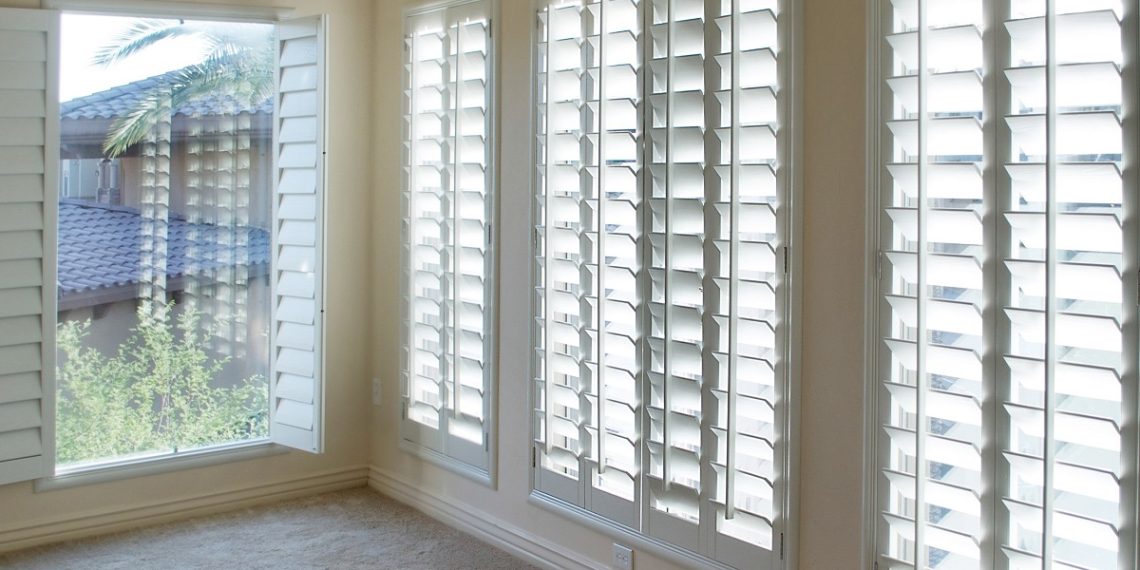Coming across the best shutters for your home, you may have heard of plantation shutters – to be more generic, they can be called plantation blinds as well. These are commonly made from wood, and designed as slatted blinds that are drilled inside your door or window frame where it sits inside as well. Plantation shutters are on the other hand different from window shutters, where they have wider louvres compared to the narrow and smaller louvres of traditional shutters – thus they are typically used in a bay or big windows and doors, where their flaps work best and are also adjustable and convenient to use.
Wood Plantation Shutters
The most common material used to create plantation shutters is wood. Wood provides its beauty, giving a window with a protective layer incorporating a natural, raw, authentic, yet sophisticated look, bringing in that natural texture and colour for your home. These shutters can also be affordable, depending on what type of wood you prefer -but the harder the wood, the better its performance and quality.
Pros and Cons for Wood Plantation Shutters
Wood Plantation Shutters Pros:
– They are very sturdy, provided that you put the material in the highest grade. Thus, they aren’t easy to bend or crinkle, and may even stand the test of time.
– Wooden Plantation Shutters are very easy to clean; the wide slats are very much reachable from end to end, making just polish and a microfibre cloth enough to keep them squeaky clean
– Wood is deemed to be a good thermal insulator, hence a better way for you to maintain room temperature as you want it to be
Wood Plantation Shutters Cons:
– As they bend inwards once you open them, you cannot place furniture right in front of it as it might be pushed or can shut down without you adjusting it.
– As they can be made from hardwood, some of them might be a little more pricey than others (but better buy them because they are very durable and can last for a few decades).
Composite Plantation Shutters
Composite Plantation Shutters are just like wooden ones, however, the material may look like it but it’s just engineered wood, fake wood, or faux wood as anyone would describe it. The material used for composite shutters is sawdust, which is processed and glued together in a vinyl or PVC coating. Yet, they also work well in homes, providing you with a shutter that looks like wood but is very much more affordable than any other plantation shutter.
Pros and Cons for Composite Plantation Shutters
Composite Plantation Shutters Pros:
– Sturdy and effective, and appears like real wood without the need to spend more.
– They are resistant to weather and humidity, as the surface works like plastic with no worry of stains, or breaking down of fibres when it is exposed to heat and water
– It doesn’t crack or warp, compared to wooden plantation shutters
– Wiping and polish works like a charm – no need for inconvenient cleaning procedures as you wipe the dust off
Composite Plantation Shutters Cons:
– The only con is how they absorb heat; the materials used for composite shutters can generate heat on the slats, which can burn when exposed to too much heat
Vinyl Plantation Shutters
Referred to as the most cost-effective type of plantation blinds, vinyl shutters are made with PVC or aluminium supports to prevent sagging, warping, and bending. These shutters are best suited in areas with high moisture, as it does not absorb anything liquid at all. Yet, there are various types of vinyl plantation shutters. These are:
Vinyl Clad Wood – made from hardwood and coated in a vinyl casing, where it is durable as real wood and resistant yet resistant to moisture.
Solid Vinyl – made from a vinyl frame filled with a blown-in PVC. Stable and effective, while costs are generally deemed the lowest for big slats.
Solid Vinyl with aluminium insert – also made from vinyl but with aluminium inserted at the centre of each slat to provide better hold and stability.
Hollow Vinyl – made from hollow vinyl frames, they are preferred to be made in small slats; vinyl made big can cause sagging, which can occur when too much heat is present.
Structured Hollow Vinyl – just like the conventional vinyl shutters, but are better than them as they have an added vinyl skeleton inside the slats.
Pros and Cons for Vinyl Plantation Shutters
Vinyl Plantation Shutters Pros:
– resistant to the sun’s UV rays which protects the furniture inside your homes
– Cheaper but still with a practical advantage
– Can come in different colours, depending on the manufacturer
– also cleans easily with mere wiping and polishing
Vinyl Plantation Shutters Cons:
– they are only suitable for small windows as they tend to sag when made to bigger slats
– Plastic-looking and can crack and chip easily when cleaned drastically
– Appears cheap compared to plantation shutters made from natural materials
Shutters are predominantly preferred by everyone. Aside from the luxurious and aesthetically pleasing look, it gives to your room, they can be beneficial especially when you live in the city; the thick design and composition of shutters are generally known to be a good insulator of heat, prevents sound waves from coming inside, and most especially providing your room with a blackout facility where you can block the sun even on the brightest of day.


